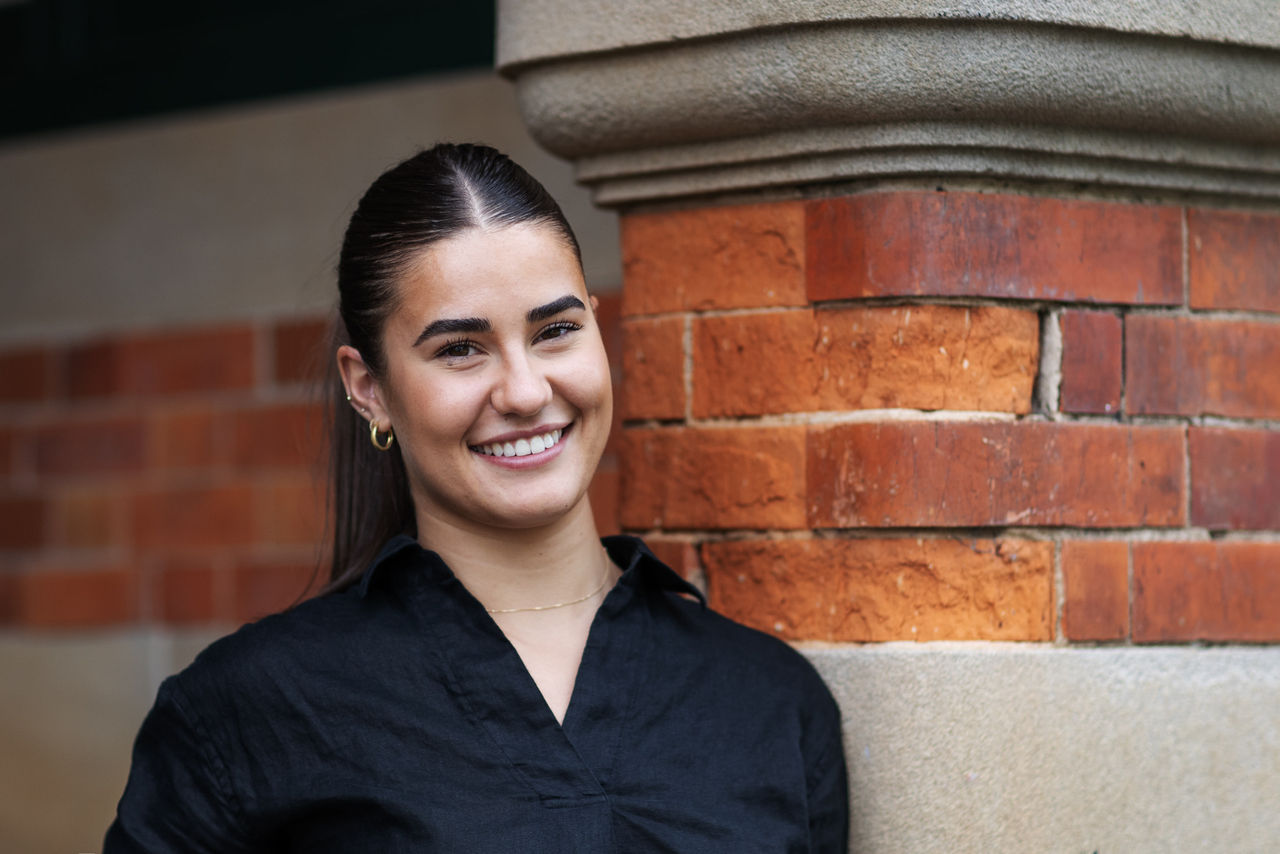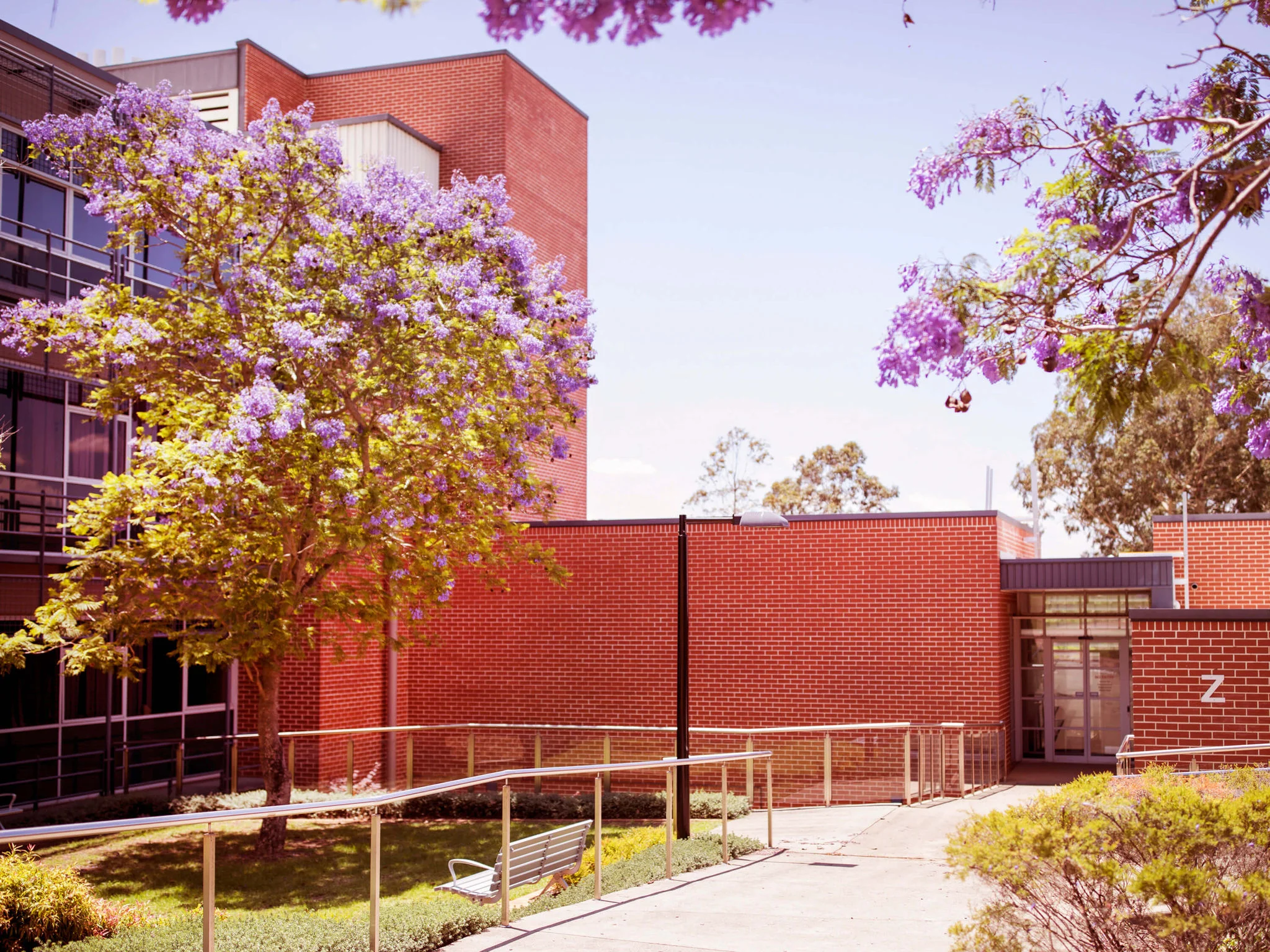This program will put you on the path to a Master of Teaching, and a rewarding career as a primary-school teacher. Look forward to agency placements and field experience that will give you a real sense of what it’s like to teach. This program also gives you skills to explore your prospects beyond the classroom, such as communication and media industries, psychology and counselling, cultural and social policy analysis, and writing and publishing.
The smart path to teaching
As an Adobe Creative Campus, Western Sydney University gives all students complimentary access to the Adobe Creative Cloud, so you can level up your digital skills with FREE access to the Adobe Creative Cloud apps. It's like your very own innovation toolkit, where technology meets creativity!
Adobe Creative Cloud is a comprehensive suite of software tools and services which provide a one-stop platform for professionals and enthusiasts in various creative fields, offering a wide range of applications for graphic design, video editing, web development, photography, and more!
This pathway of study is accredited with the NSW Education Standards Authority.
What you can expect to study
The program structure is outlined in our handbook. Here you can view all of the subjects you will be studying.
Available on Bankstown and Penrith campuses.
Social Anthropology is the study of humans and the cultures they create. The Anthropology major offers you the opportunity to examine social patterns and practices across cultures, to discover similarities and differences between cultures, and to understand the processes by which humans organise and create meaning.
Available on Parramatta campus.
The Creative Writing major provides you with the opportunity to produce your own creative writing and to edit and learn how
to publish your work.
You will study with professional authors, editors and publishers from the Writing and Society Research Centre and staff from the School of Humanities and Communication Arts.
In addition, you will have the opportunity to study contemporary approaches to language and literary studies, including literary criticism and theory, linguistic analysis, genre and textual study, and to read and examine a wide selection of modern and classic literature.
Available on Bankstown, Parramatta and Penrith campuses
Cultural and Social Analysis is an interdisciplinary major, developing the knowledge, research skills and analytical capacities relevant to understanding and interpreting landscapes of cultural diversity and social difference in our contemporary world.
This major focuses on both the broad contours, as well as the specific microsocial environments. This major provides grounding in contemporary debates and methodologies in cultural studies and social theory, and draws on various disciplines, including history, sociology, film studies, and the visual arts.
Topics include popular culture, everyday urban life, cultural and social impacts of scientific theories and new technologies, multiculturalism, and contemporary spirituality.
Available on Bankstown, Parramatta and Penrith campuses.
The English major invites students to explore contemporary approaches to language, literary studies and writing, including literary criticism and theory, linguistic analysis, genre and textual study, and creative writing. The English major focuses on the imaginative workings of language, and students can study a wide selection of modern and classic literature, as well as the relationships between written texts and other media such as film and information technology.
Students also have the opportunity to produce their own creative writing and to edit and learn how to publish their work. Career prospects include publishing, editing, teaching, writing and advertising.
Available on Parramatta and Penrith campuses.
Geography is the integrated study of people, places and environments. In this major, you will examine the geography of contemporary Australian cities and regions. The interests of today’s geographers include post-colonialism, the emergence of global information economies, indigenous issues, class and cultural disparities, population movement, sexuality and space, and the global diffusion of popular culture.
Urban Studies is a discipline focused on social justice within the city, through its critical assessments of people’s access to scarce urban resources, such as housing, transport, education and employment.
The political, economic and cultural forces that shape cities and urban policy are the key concerns of the Urban Studies curriculum. These applied interests in urban wellbeing and city structure are the intellectual basis for the urban planning profession.
Available on Bankstown, Parramatta and Penrith campuses.
Since the revival of humanist thought in the Renaissance, universities have placed studies in history and political thought at the centre of exploring what it is to be human.
At the heart of the History and Political Thought major are four compulsory units, which introduce the student to the modern history of humanity (since 1500). Although Europe is very prominent in the major, you will be invited to compare its history to the histories of Asia, Africa and the Americas.
The major culminates in a capstone unit in students’ final semester, discussing historical theories and methods. A wide range of elective units covers European, American, Australian and Asian history and political thought, and includes thematic units which range widely over time and place.
Available on Bankstown, Parramatta and Penrith campuses.
What does it mean to live in Indigenous Australia? The Indigenous Australian Studies major offers you the exciting opportunity to acquire key cultural competencies that will enable you to understand and work more effectively with Indigenous Australians in professions such as the arts, communications, media, education, government and non-government, policy, health, sciences, and community services.
The Indigenous Australian Studies major addresses the cultural, historical, social and economic issues affecting Indigenous and non-Indigenous Australians, and relationships.
Available on Bankstown and Parramatta campuses.
International English examines English in its many varieties with a focus on the international development of the language, extending far beyond native English speakers, and identifying features of the language essential to academic and professional performance.
The major provides a basis for international students who may intend to teach English in different countries, or enter other language-centred professions, or for local students intending to pursue post-graduate degrees in education or wanting to improve English skills.
The major provides studies in the varieties and structures of English, informed by specific studies in linguistics, English teaching and bilingualism, and language acquisition.
Available on Bankstown and Parramatta campuses.
This major has been designed to meet the needs of Australian government, business and society, to engage the states and peoples of Asia at all levels in pursuit of national interests and as part of the globalisation process.
It provides you with the opportunity to study contemporary Asia, in addition to the rich and diverse histories, politics, cultures and languages of Asian countries, as well as the international issues affecting Australia’s interests and role in the region and in the world at large.
The major area also includes a range of units concerned with the United States and Europe as well as with Asia itself, and units in international relations covering other parts of the world. It seeks to produce graduates with a broad, liberal education, and with the skills to mediate between Australia and the world in general, and Asia in particular through political, economic, commercial, cultural, diplomatic and strategic links.
You are encouraged to undertake a minor in an Asian language in conjunction with the major.
Available on Bankstown campus.
In this major you will engage in interdisciplinary study essential to an understanding of Islam, past and present. The area of study balances historical and modern Islamic studies and research methods. One of the keys to Islamic Studies is ‘relevance’ to contemporary Australian society, but relevance can only come from a sound comprehension of past traditions in Islamic scholarship and their socio-historical contexts.
Preparation for graduate study is also a key objective of this program, with its focus on developing critical and interdisciplinary research skills through a combination of approaches.
Language is fundamental to the human experience. Through study of how language works, students make contact with fundamental philosophical, socio-cultural, and psychological questions about what it means to be human. Linguistics prepares students with a foundation for many careers including primary and secondary teaching, policy analysis, communication, and social services in culturally diverse communities. Linguistics students also gain the analytical tools of empirical science including the ability to break complex problems into components with tractable solutions and to evaluate theories on the basis of empirical facts. These skills prepare students for success in post-graduate studies and careers in research, analytics, business and law.
Available on Penrith campus.
Music is a universal art form. It transcends geographical, national, political, cultural and racial boundaries, and can evoke the full spectrum of emotions in listeners.
Music encourages introspection, inspires social awareness and unity, and has even been known to inform policy.
The Music Performance major provides you the opportunity to develop your professional and creative potential in making and appreciating a range of different types of music. You will gain practical experience in performance as a soloist and in groups, in composition, audio production, film music, and collaboration.
Available on Penrith campus.
Musicology is the academic study of music which focuses on the history, theory and cultural contexts of music. You will focus on repertoire and media of the 20th and 21st centuries and also study music from earlier historical periods. You will gain practical experience in library research and retrieval.
Available on Parramatta and Bankstown campuses.
A major in Organisations and Work provides you with the skills to initiate valued change and contribute in the complex field of management. The development of strategic knowledge provides strong analytical outcomes directed at understanding the impact managers have on organisational decision making.
This major also aims to instil values and attitudes that support leaders in judgements about balancing the pursuit of organisational objectives with creating opportunities for developing people’s capacities.
Available on Bankstown and Parramatta campuses.
Philosophy has always asked the ‘big questions’, for example, about the limits of our knowledge, the best way that humans can live together, how we understand the world around us, and what is ‘the good life’.
Our philosophy major enables you to develop particular skills and attributes – such as clear thinking, capacities to assess arguments and values, and sound understanding of important philosophical views – that have always been essential to university scholarship and which continue to be valuable for graduates in both public and private life.
Available on Bankstown, Parramatta and Penrith campuses.
The Psychological Studies major comprises units in the discipline of psychology that focus on the field of inquiry, using scientific techniques and methods to understand and explain behaviour and experience.
Units in the program are drawn from the following core areas of psychology: brain and behaviour, learning, motivation and emotion, social psychology, lifespan development, perception, and cognitive processes.
Available on Bankstown and Penrith campuses.
Sociology is the study of society and culture. Using diverse methods, practices and theories, it helps us understand social life. Sociology is fundamental to the social sciences because the quality of life of every human on the planet is directly or indirectly influenced by their relative position within, and responses to, society.
This major in Sociology provides you with a thorough training in the methods, theories and select leading areas of contemporary sociology. In the Sociology major, you will have opportunities to study particular themes from a sociological perspective, including inequalities, deviance, identities, gender, religion, medicine and health care, ethnicity and migration, and the family, among other possibilities.
A Bachelor of Arts with a major in Sociology will prepare you for both employment and a research higher degree.
Language specialisations aim to enable students to develop an appropriate level of proficiency in a second language, which may be used for professional purposes such as teaching, interpreting and translation, business or international relations. Students undertaking a language specialisation will be able to use the language in question according to its grammatical and pragmatic principles, communicate with native speakers appropriately in the spoken as well as the written mode, and demonstrate an understanding of the cultures and societies associated with the language.
Language majors aim to enable students to develop an appropriate level of proficiency in a second language which may be used for professional purposes such as teaching, interpreting and translation, business or international relations. Students undertaking a language major will be able to use the language in question according to its grammatical and pragmatic principles, communicate with native speakers appropriately in the spoken as well as the written mode, and demonstrate an understanding of the cultures and societies associated with the language.
Language specialisations aim to enable students to develop an appropriate level of proficiency in a second language, which may be used for professional purposes such as teaching, interpreting and translation, business or international relations. Students undertaking a language specialisation will be able to use the language in question according to its grammatical and pragmatic principles, communicate with native speakers appropriately in the spoken as well as the written mode, and demonstrate an understanding of the cultures and societies associated with the language.
Language majors aim to enable students to develop an appropriate level of proficiency in a second language which may be used for professional purposes such as teaching, interpreting and translation, business or international relations. Students undertaking a language major will be able to use the language in question according to its grammatical and pragmatic principles, communicate with native speakers appropriately in the spoken as well as the written mode, and demonstrate an understanding of the cultures and societies associated with the language.
Career Opportunities
As a graduate of this degree, you can look forward to a broad range of exciting career opportunities in different sectors and industries. Below are some examples of the possible careers you can pursue with this degree:
- Go on to complete your Master of Teaching (Primary) and become a primary school teacher.
- Or open to the door to a great career in policy work, curriculum development, administration, and a host of opportunities specific to your chosen major.
Entry requirements for domestic students
Applicants who have undertaken studies overseas may have to provide proof of proficiency in English. Local applicants who are applying through the Universities Admissions Centre (UAC) will find details of minimum English proficiency requirements and acceptable proof on the UAC website. Local applicants applying directly to the University should also use the information provided on the UAC website. Find out more here.
Admission
- Assumed knowledge: two units of HSC English.
- Recommended studies: HSC English Standard, or equivalent.
Please consult the handbook for more information.
Entry requirements for international students
**Please note, if this course lists a part-time option, this is not available to International Students on a Student Visa.
Please consult the handbook for more information regarding entry requirements for this course.
You can read more about international academic entry requirements here.
Indicative annual fee
A Commonwealth Supported Place (CSP) is one that is subsidised by the Commonwealth and applicable only to Domestic students. This means that the Australian Government pays part of your fees towards your program, therefore reducing your program fees, and the remaining amount is paid by you, this is considered your Student Contribution.
The fee estimates provided are indicative only and subject to change. These estimates are based on the current fee structures for a normal full time study load. However, the final fees may vary depending on several factors, including the specific subjects chosen, the duration and timing of study, and annual fee adjustments (subject to Commonwealth student contribution band rates). Please note that these estimates do not include the Student Services and Amenities Fee. We encourage all prospective and current students to consult with our Student Services Hub for the most current fee information.
As a multi-campus institution, Western Sydney University and its entities reserves the right to alter the location of its programs between campuses and other locations as necessary.
To work out how much your Student Contribution will be before you study, you will first need to find out the Student Contribution band your subjects fit into based on their general discipline area.
You can then calculate your student contributions to work out the total amount of your contribution.
The Higher Education Loan Program (HELP) is a range of loans introduced by the Australian Government from 2005 to provide fee payment assistance to eligible students. Loans are for Australian citizens studying in Australia or overseas. Permanent residents who hold a humanitarian visa are also eligible if studying in Australia.
If eligible you may be able to defer all or part of your Student Contribution through the HECS-HELP loan program. You may also be eligible for OS-HELP if undertaking studies overseas.
New Zealand citizens and holders of an Australian permanent resident visa (other than an Australian permanent humanitarian visa) are generally not entitled to HECS-HELP assistance. If you are a New Zealand citizen or permanent resident your Student Contribution amount must be paid in full by the census date.
However, the Australian Government has passed new legislation that changes the way some New Zealand citizens, who hold a Special Category Visa (SCV), studying in Australia will pay their fees. More information is available on the Changes to fees for New Zealand Citizens webpage.
Apply as a Domestic Student
If you are a domestic student, you can apply through our Western Application system which is free of charge.
Domestic students are:
- Australian Citizens
- New Zealand Citizens
- Australian permanent residents
- Australian permanent humanitarian visa holders
Scholarships
Western Sydney University recognises and rewards students who demonstrate community engagement, outstanding academic ability and superior leadership skills. Donor-funded scholarships are also available, providing support for students based on both academic achievements and equity considerations. There are also scholarships available for specific degrees.
The fee estimates provided are indicative only and subject to change. These estimates are based on the current fee structures for a normal full time study load. However, the final fees may vary depending on several factors, including the specific subjects chosen, the duration and timing of study, and annual fee adjustments (subject to Commonwealth student contribution band rates). Please note that these estimates do not include the Student Services and Amenities Fee. We encourage all prospective and current students to consult with our Student Services Hub for the most current fee information.
As a multi-campus institution, Western Sydney University and its entities reserves the right to alter the location of its programs between campuses and other locations as necessary.
Apply as an International Student
If you are an international student, you can apply for free through our international student application system or through an agent representative.
International students are:
- Not an Australian citizen;
- Not a New Zealand citizen; and
- Not a permanent resident of Australia.
If you are an international student completing the Australian HSC, IB or NCEA, apply direct via UAC International.
Admission to Western Sydney University is on the basis of meeting minimum academic and English language requirements. For more information about tuition fees and other costs, visit the Fees and Costs page.
Scholarships
When you apply to Western, you’re automatically assessed for a Scholarship, no additional application required! We’re offering multi-year scholarships (for up to 3 years) valued at $6,000 or $3,000 and even 50% off tuition fees. Scholarships are awarded on academic merit.
FAQs
We've gathered common questions to provide you with quick, clear answers about this program. Whether you're exploring admission requirements, details about the degree or career prospects, you'll find valuable insights here. If you need more information, our support team is ready to assist you on your journey to Western. You can find their details below.
As a full-time student, you will study 3 years in the Bachelor and either 1 or 1.5 years in the Master depending on your GPA* (minimum amount of time = 4 years / maximum amount of time = 5 years). As a part-time student, this may take up to 8 years.
Want to know more?
We're here to provide clarity.
If you're uncertain about your study journey, enquire about our program today and gain the confidence to move forward.
Australian students
1300 668 370
International students
+61 2 9852 5499

The fee estimates provided are indicative only and subject to change. These estimates are based on the current fee structures for a normal full time study load. However, the final fees may vary depending on several factors, including the specific subjects chosen, the duration and timing of study, and annual fee adjustments (subject to Commonwealth student contribution band rates). Please note that these estimates do not include the Student Services and Amenities Fee. We encourage all prospective and current students to consult with our Student Services Hub for the most current fee information.
As a multi-campus institution, Western Sydney University and its entities reserves the right to alter the location of its programs between campuses and other locations as necessary.






